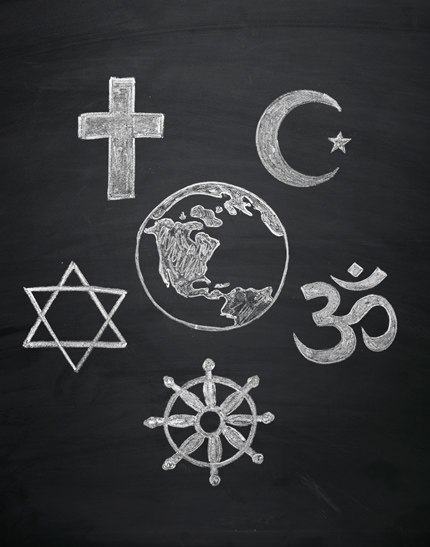The views expressed in our content reflect individual perspectives and do not represent the authoritative views of the Baha'i Faith.
Does the singularity of God require a singularity of religion? If you have faith, does it mean you’re restricted to one Faith?
Many who hold more traditional beliefs take this as axiomatic. “Why would God confuse and contradict himself?” they ask. Traditionalists also cite scripture, which often seems to them to indicate an exclusive, final and singular revelation from God, no matter what their religion. For example—Muslims relate the finality of Islam to Quranic verse: “Muhammad is not the father of any of your men, but (he is) the Messenger of Allah, and the Seal of the Prophets.” In Christianity, Christ said, “I am the way, the truth, and the life: no man cometh unto the Father, but by me.” Believers typically use these verses to claim exclusivity and finality for their Faiths.
Assuming at least a marginal belief in science, does this idea seem consistent with what we know about our universe?
 Given the enormity of the size and age of the known universe, such assertions of the singularity of revelation across time and place would seem to defy any sense. The claim that over billions of past years and the billions more to come, spanning uncountable star systems and planets, the Divine only revealed itself once, a thousand or two thousand years ago, in a very small section of the planet, just doesn’t seem credible. Why would a merciful, loving God operate that way, and then never again reveal divine teachings until the universe ends?
Given the enormity of the size and age of the known universe, such assertions of the singularity of revelation across time and place would seem to defy any sense. The claim that over billions of past years and the billions more to come, spanning uncountable star systems and planets, the Divine only revealed itself once, a thousand or two thousand years ago, in a very small section of the planet, just doesn’t seem credible. Why would a merciful, loving God operate that way, and then never again reveal divine teachings until the universe ends?
In fact, such an idea would seem ludicrous. For example, assuming a “final” revelation has already come to pass, it would seem impossible to even preserve the information related to it over the course of a hundred thousand years, let alone a billion. Believing in this kind of singularity would lead almost anyone to conclude that 1.) God is terribly unjust, or 2.) Many revealers of God’s message existed, which means that revelation is not singular.
But of course the question then arises: why do the revelations seem so different? How can we deal with the observed differences between the existing religions? We observe multiple laws of God, multiple types of metaphysics, and multiple ways to achieve salvation or enlightenment. Then of course there are the apparent claims of exclusivity and finality. How do we reconcile these facts?
In the mid to late 19th century, the prophet founder of the Baha’i faith, Baha’u’llah, offered an explanation of this apparent religious paradox:
The All-Knowing Physician hath His finger on the pulse of mankind. He perceiveth the disease, and prescribeth, in His unerring wisdom, the remedy. Every age hath its own problem, and every soul its particular aspiration. The remedy the world needeth in its present-day afflictions can never be the same as that which a subsequent age may require. – Gleanings from the Writings of Baha’u’llah, p. 213.
From this statement of Baha’u’llah, we see the concept that religious truth is not absolute but relative to the time and place of revelation. Baha’is call this concept “progressive revelation.” Thus the Divine reveals itself from age to age according to the capacities and needs of humanity. The Baha’i teachings compare the prophets and messengers who bring new Faiths to divine physicians who minster to the ills of society and prescribe the appropriate remedy. This remedy may be different from time to time, since the needs and the capacity of humanity changes.
Progressive revelation, as it describes the cause of the diversity of religions, actually resembles Darwin’s evolution and natural selection theory, which explains the diversity of natural organisms.
Shoghi Effendi, the Guardian of the Baha’i Faith, explained the Baha’i view of progressive revelation this way:
Its teachings revolve around the fundamental principle that religious truth is not absolute but relative, that Divine Revelation is progressive, not final. Unequivocally and without the least reservation it proclaims all established religions to be divine in origin, identical in their aims, complementary in their functions, continuous in their purpose, indispensable in their value to mankind.
All the Prophets of God,” asserts Baha’u’llah… “abide in the same tabernacle, soar in the same heaven, are seated upon the same throne, utter the same speech, and proclaim the same Faith.” From the “beginning that hath no beginning,” these Exponents of the Unity of God and Channels of His incessant utterance have shed the light of the invisible Beauty upon mankind, and will continue, to the “end that hath no end,” to vouchsafe fresh revelations of His might and additional experiences of His inconceivable glory. To contend that any particular religion is final, that “all Revelation is ended, that the portals of Divine mercy are closed, that from the daysprings of eternal holiness no sun shall rise again, that the ocean of everlasting bounty is forever stilled, and that out of the Tabernacle of ancient glory the Messengers of God have ceased to be made manifest” would indeed be nothing less than sheer blasphemy. - The World Order of Baha’u’llah, p. 58.
Now, if we go back and reconsider religious history in this new light, we can see many elements of the concept in previous revelations. For example, the Christian Bible narrates a history of revelation evolving from the Old Testament and focused on “law” and punishment to that of the New Testament’s focus on love and forgiveness. In that progressive revelation we see many examples of laws changing, like the law of the Sabbath and divorce. The Qur’an links all Judeo-Christian revelation into a continuous belief system, and calls them all Muslim. In Hinduism, this concept already exists in the form of recurring Avatars, and Krishna basically states it outright in the Bhagavad Gita:
Whenever there is decay of righteousness and there is exaltation of unrighteousness, then I Myself come forth, for the destruction of evil-doers, for the sake of firmly establishing righteousness, I am born from age to age.
In Buddhism, which grew out of Hinduism, the idea of re-current and progressive revelation is carried forward in the concept of an eternally-recurring Bodhisattva.
All of the world’s great Faiths tell of a future revelation. Despite apparent claims of finality, all await a time when God or the Divine will manifest itself again. These include predictions of the Messiah, the return of Christ, the Imam Mahdi, the Tenth Avatar, the Fifth Buddha, and the Shah Bahram. Traditional interpretations have always held that whenever that future revelation comes, it will uphold the same laws and occur in a fantastic and supernatural manner. As such, most new revelations are rejected initially by the leaders of existing religions. For example, most Jews rejected Jesus as the Messiah, and most Christians rejected Muhammed as fulfilling the prophecies in the gospel.
The existence of multiple religions and revealers is a natural consequence of living in very large, ancient cosmos. The differences in the laws and teachings between these revelations can be attributed to the differences of each age and place. The Baha’i teachings say that progressive revelation serves as the natural mechanism which differentiates and ultimately unites all of these religions.
















Comments
Sign in or create an account
Continue with Googleor